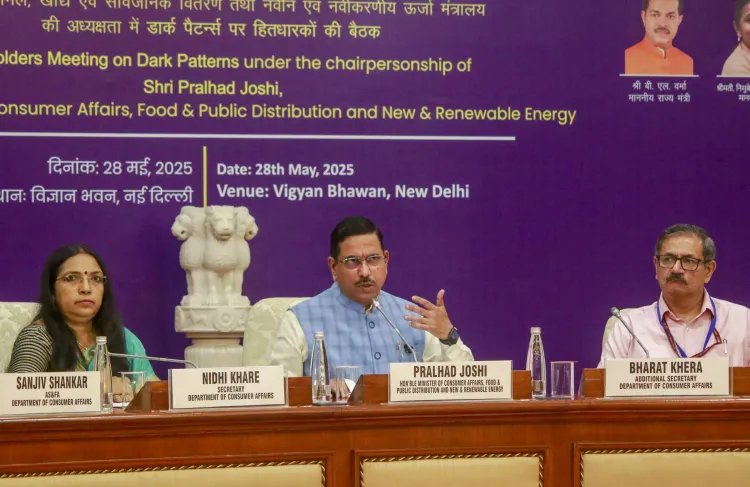Should E-commerce Firms Evaluate and Eliminate Dark Patterns?

Synopsis
Key Takeaways
- Government mandates e-commerce firms to eliminate dark patterns.
- Self-auditing is essential for compliance with consumer protection.
- Consumer trust is a priority for the industry.
- Dark patterns undermine consumer autonomy and welfare.
- Innovative tools have been developed to aid consumer protection.
New Delhi, May 29 (NationPress) In response to the escalating concerns surrounding dark patterns in online commerce, the government has mandated that all e-commerce platforms perform self-assessments to identify and eliminate these deceptive practices, ensuring adherence to consumer protection regulations.
The Union Minister for Consumer Affairs, Pralhad Joshi, highlighted the necessity of ethical behavior within the industry, noting that the guidelines concerning dark patterns emerged from thorough discussions with various stakeholders, including prominent e-commerce entities and industry organizations.
With a consensus reached, the minister urged all businesses to fully adopt these guidelines and weave them into their internal governance and consumer protection frameworks.
“Today's consumers are alert, informed, and increasingly aware of their rights — they will not accept dishonesty,” Joshi stated during a high-level stakeholder meeting held here.
The Department of Consumer Affairs organized this meeting, which convened key representatives from major e-commerce companies, industry associations, voluntary consumer groups, and national law universities for an in-depth conversation about eradicating misleading online practices.
Joshi pointed out a notable increase in consumer complaints regarding dark patterns reported on the National Consumer Helpline (NCH).
“Companies should not wait for the Central Consumer Protection Authority (CCPA) to take action. They need to proactively identify and eliminate these misleading practices before any notices are issued. This goes beyond mere regulatory compliance — it’s about fostering trust with your consumers,” he emphasized.
Furthermore, he acknowledged that the innovative ideas and technological solutions generated through the ‘Dark Patterns Buster Hackathon 2023’ were instrumental in assisting the Department, in collaboration with IIT BHU, to create three significant consumer protection tools — the Jagriti App, Jago Grahak Jago App, and Jagriti Dashboard.
“These tools stand as a testament to our commitment to combat deceptive design practices that mislead consumers online,” the minister remarked.
Nidhi Khare, Secretary of the Department of Consumer Affairs, provided a compelling introduction to the theme and elaborated on the Department’s multi-faceted initiatives to tackle this urgent issue.
She pointed out the alarming rise of dark patterns — design elements utilized on websites and apps to mislead or coerce users into making unintended choices.
These practices undermine consumer autonomy, manipulate purchasing behavior, and negatively affect consumer trust and welfare. She stressed that addressing dark patterns is critical for safeguarding consumer rights and ensuring equitable digital commerce.










